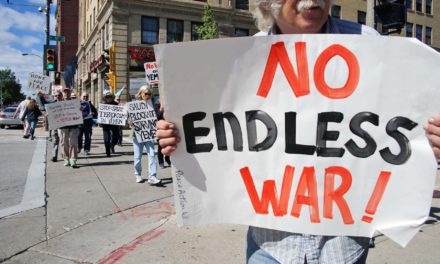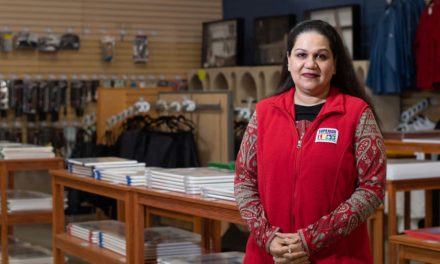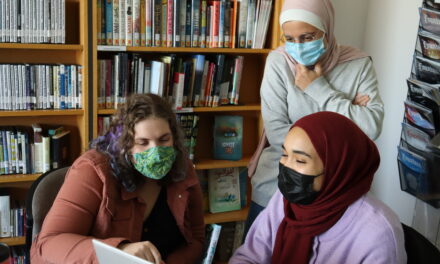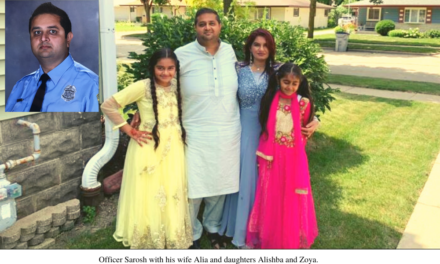Dr. Hashim Zaibak
As the COVID-19 vaccination rolls out across the state, Wisconsin Muslims are educating themselves on the new vaccines and their related responsibilities as Muslims.
Frontline workers in Wisconsin began receiving the first of two doses of the Pfizer-BioNTech Covid-19 vaccination last week. Among them was Dr. Raed Hamed, an ICU doctor in Milwaukee, who took it on Thursday.
“I didn’t have any side effects, just a little soreness in my arm, similar to the flu shot,” he said.
Hamed is in the first tier of vaccine recipients as someone working directly with COVID-19 patients. Nevertheless, taking it was voluntary, he said. “I read the initial studies published by Pfizer and BioNTech that were submitted to the CDC (Centers for Disease Control and Prevention). I reviewed the safety information. I saw that it is 50% effective after the first dose and 95% effective after the second dose.”
Nisreen Atta, an emergency room nurse in Milwaukee, also took the vaccine last week. “So thankful that I had the opportunity to receive the COVID vaccine today!” she posted on Facebook. “Here’s to hope, optimism, confidence in research and brighter days ahead.”
Atta said she too had a “slightly sore arm the night of the vaccine, but felt fine” when she worked 12 hours the next day. “I actually thought it was much better than the flu shot,” she said.
The distribution will take months to reach everyone
Even with the Pfizer-BioNTech vaccine distribution starting last week and the Federal Food and Drug Administration announcement Friday that the Moderna vaccine is now approved, availability for the general public is not expected until spring or summer.
In Wisconsin’s first tier, 400,000 health care workers and about 57,000 nursing home residents are to be vaccinated. Just how long it will take is not clear, Wisconsin Secretary of Health Services Andrea Palm is reported saying in a Dec. 17 article in the Wisconsin State Journal. Given that the Pfizer and Moderna shots each require two doses three or four weeks apart, the effort that started last week could take months to complete, WSJ reported. It depends on how much vaccine arrives each week and there have been reports that Wisconsin has received fewer doses than expected.
Other priority groups include essential workers, the elderly, and people with high-risk medical conditions.
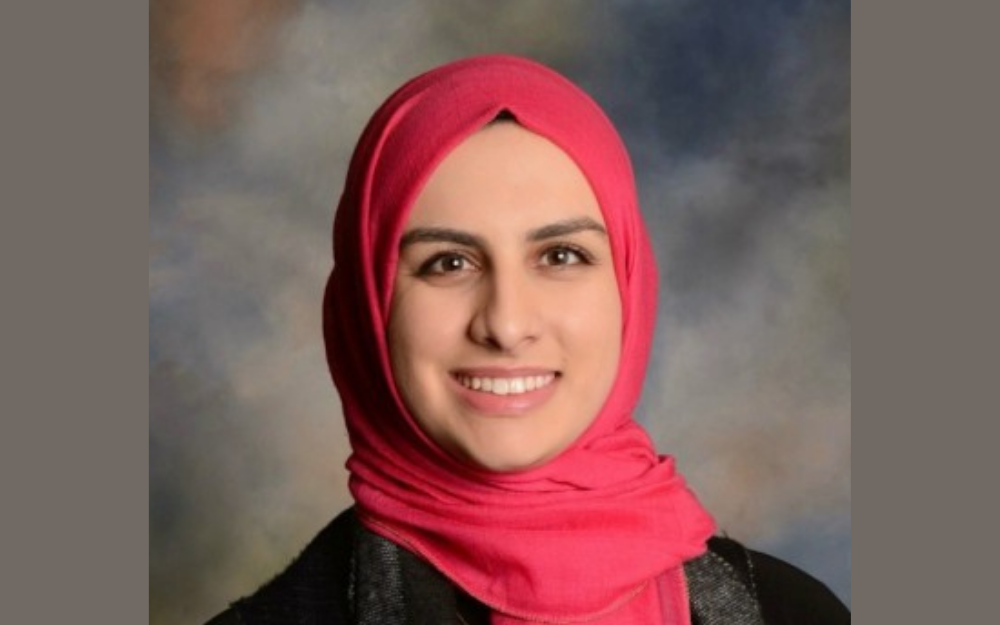
Nurse Nisreen Atta
Time to learn and take action
In “COVID-19 Vaccination: Facts & Myths,” a program hosted last week by the Islamic Society of Milwaukee – West, Dr. Hashim Zaibak, a pharmacist, and owner of Hayat Pharmacies, and Imam Noman Hussain discussed what we know, as well as some myths being circulated, about the coronavirus vaccines. Hussain said it is a duty for Muslims to get vaccinated because doing so protects others as well as yourself.
Zaibak graduated from the University of Illinois – Chicago Pharmacy school. He moved to Wisconsin in 1999 to accept a pharmacist position at CVS. In 2011, he left CVS to launch Hayat Pharmacies. Since his arrival to Wisconsin, Zaibak has focused on serving underserved areas, including Milwaukee’s inner city.
In a Question & Answer session, Hussain asked Zaibak the questions that are on everyone’s minds about the vaccine.
Q: Why is there a tiered rollout?
A: As in the past, we have shortages of the vaccine. When the H1N1 flu vaccine was introduced, not everybody was offered the vaccine on Day One. The government has to prioritize certain groups.
To get to the final phase and vaccinate the general public, we have to make sure we have at least 600-700 million doses available to all Americans.
Q: Does taking the vaccination to prevent someone from ever getting COVID?
A: Clinical studies showed vaccines reduced the risk by 95% but they are talking about severe and moderate COVID-19 diseases. There is still a risk of the mild COVID – 19 disease.
Like the flu shots, it doesn’t eliminate the flu completely. It lowers the risk. Someone may have a mild case or even be completely asymptomatic and still spread the virus.
Everyone asks, “Are we going to stop wearing masks as soon as the vaccine is available to everybody?” The answer is “Not yet.” We still need to wear masks for many months, probably the greater part of 2021. Until we get to the 70% mark, when 70% of the population has good immunity, we should still be socially distancing, still be wearing our masks when we are around people, and not have gatherings, weddings, and parties.
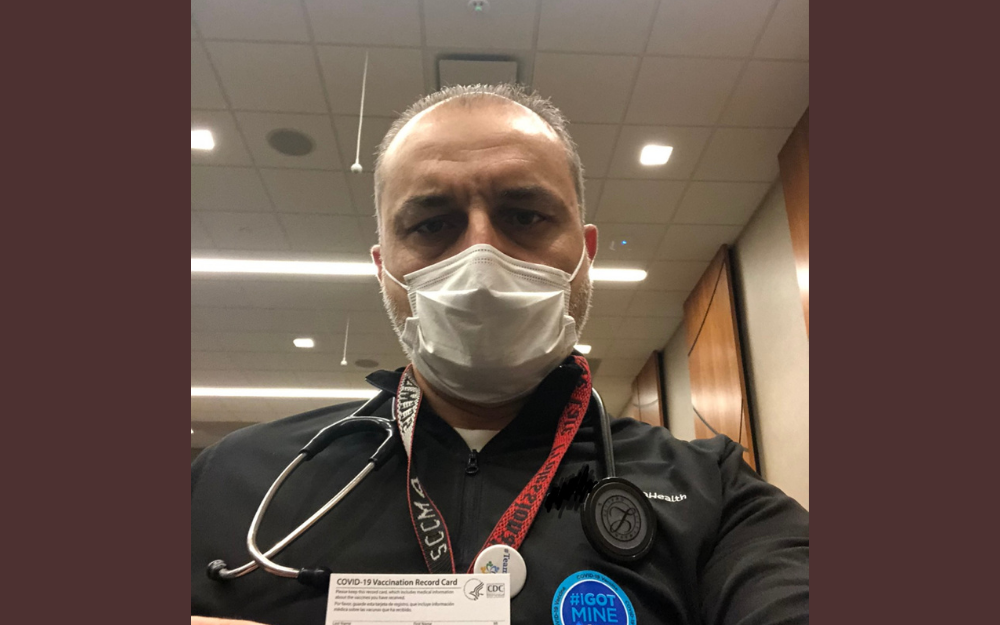
Dr. Raed Hamed
Q: If someone already tested positive for COVID, do they need to take the vaccine?
A: They have immunity for 90 days, maybe longer. The challenge is what is going to happen after 90 days; there is a chance they can get the disease again.
And not only that, they can be spreaders of the disease. I am one of the people who got the disease. I am now in the 90-day protection period but as soon as it’s my turn, I am planning to get the vaccine myself and I recommend others do, too.
Q: If someone gets the vaccine, how long does the immunity last?
A: We don’t know yet. It is a new disease and a new vaccine. We are hoping it will give you at least one-year protection.
Q: What are the side effects?
A: Like any medication, there will always be that small percentage in the population that is allergic to it. Most people will have symptoms similar to the flu shot. Some people will get the chills, a temperature, body aches, the local reaction to the injection – those are the common side effects that researchers saw in the clinical studies.
Q: Do we need to be concerned about how quickly it was developed and released?
A: Today you have new technology you didn’t have 20 years ago. It was very different when the polio vaccine was introduced decades ago. One of the beautiful things about the messenger RNA vaccine is that it is easier to make than vaccines we have had in the past. One of its advantages is that a massive amount can be produced in a short period of time. It is easier and less expensive to make.
This technology was chosen because we need this vaccine as quickly as possible. If we used the old tools we used 10 years ago, it would take us years to stop this pandemic. I truly feel this is a game-changer, a different kind of vaccine. It may become a normal way to make vaccines in the future.
Q: Is the vaccine going to change our DNA?
A: When the mRNA gets injected into our bodies, it goes into the cytoplasm. When it gets inside the cell, it does not get in the nucleus where our DNA is. To change anything about our genetic material you have to get inside the nucleus.
Q: How does it work?
A: It basically has a blueprint that allows the cell to make proteins called viral spikes. And those viral spikes eventually get on the surface of the cell. Our immune systems look at them as foreign bodies and attack them. That is how immunity is built. Once it has done its job and makes those proteins, the body gets rid of it and it is not in our body anymore.
Q: The Pfizer vaccine has to be stored at very cold temperatures. How will you store it?
A: It has to be storied at -70 C. To buy one of those super cold freezers is $25,000 per unit. But the manufacturer will ship them in boxes with dry ice. If we replace the dry ice every five days, we can keep it in the boxes for 30 days. Once we put a vial in a normal refrigerator, it is good for five days. With the demand, I don’t think we will keep them for more than a few days.

Imam Noman Hussain
Q: What happens if mistakes are made?
A: There is a tracking device in the box. We can track where the box is and the temperature in the box. If a mistake is made, it would have to be discarded and that would be very unfortunate.
Q: Do people need a prescription to get it?
A: Vaccines are by prescription only. However, a lot of pharmacies have a standing order from a physician at the state level. So, if anyone who walks into your pharmacy, you can administer the vaccine based on guidelines. You have to screen them for certain things and you have to be ready in case of an emergency.
Also, in the state of Wisconsin, the rules are changing and have been changing in the last few months. Pharmacists are going to be able to be allowed to prescribe vaccines to eliminate any obstacles, especially with the COVID-19 situation.
Q: How much do I have to pay for the vaccine?
A: The vaccine itself is at no charge. There is a fee to have it administered. Those charges will be picked up by the insurance. If the patient does not have insurance, the state has a fund to cover the cost. I anticipate nobody to pay a penny.
Q: If someone is immune-compromised, do you recommend this vaccine?
A: But most vaccines are dead viruses. This vaccine is different. It is a more pure form. I anticipate the answer for most people is yes. Even people with HIV or AIDS are going to be candidates. But I do recommend that before they go for the vaccine, they talk to their specialist who is handling their case to make sure.
Q: What do you say to people who believe in conspiracy theories?
A: Unfortunately, conspiracy theories are making it harder for us to stop this disease. I ask the community to only share things from credible sources, like physicians who specialize in this field. There are a lot of independent third parties looking at this, they are not connected to the manufacturers. Those third parties have determined the benefits outweigh the potential risks.
A duty for Muslims
Imam Hussain noted that Muslims are obligated “to verify the information before we share it. This is a Quranic command; a command from Allah.
“From an Islamic perspective, we are encouraged to get the vaccine,” he said. “Some scholars say it is an obligation to get the vaccine. It is not a choice because it affects the people around you.”

